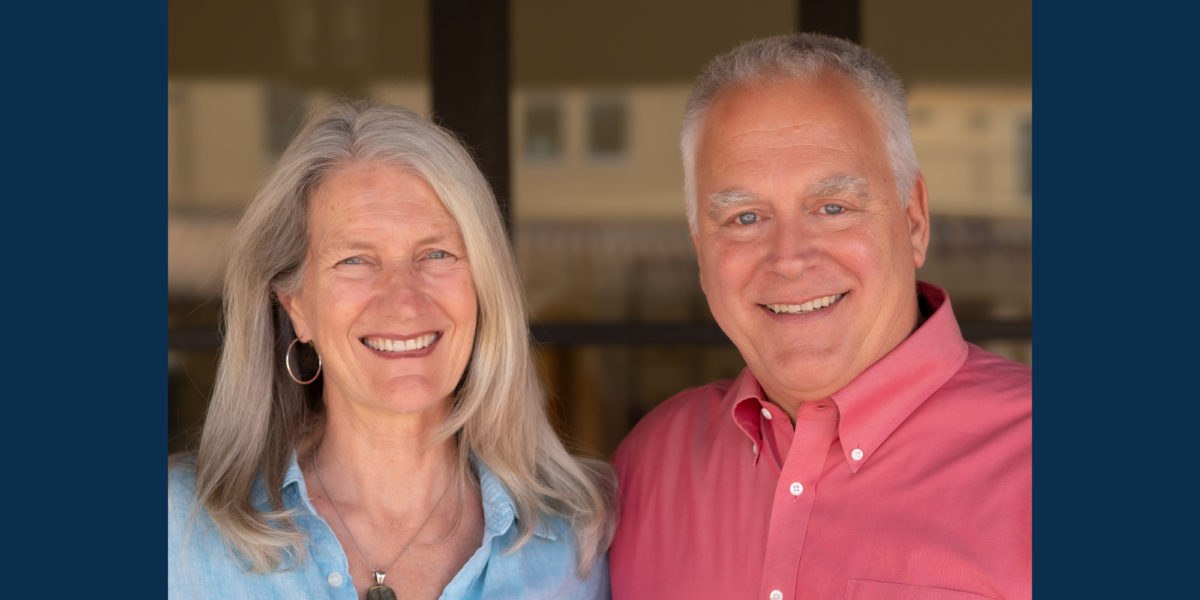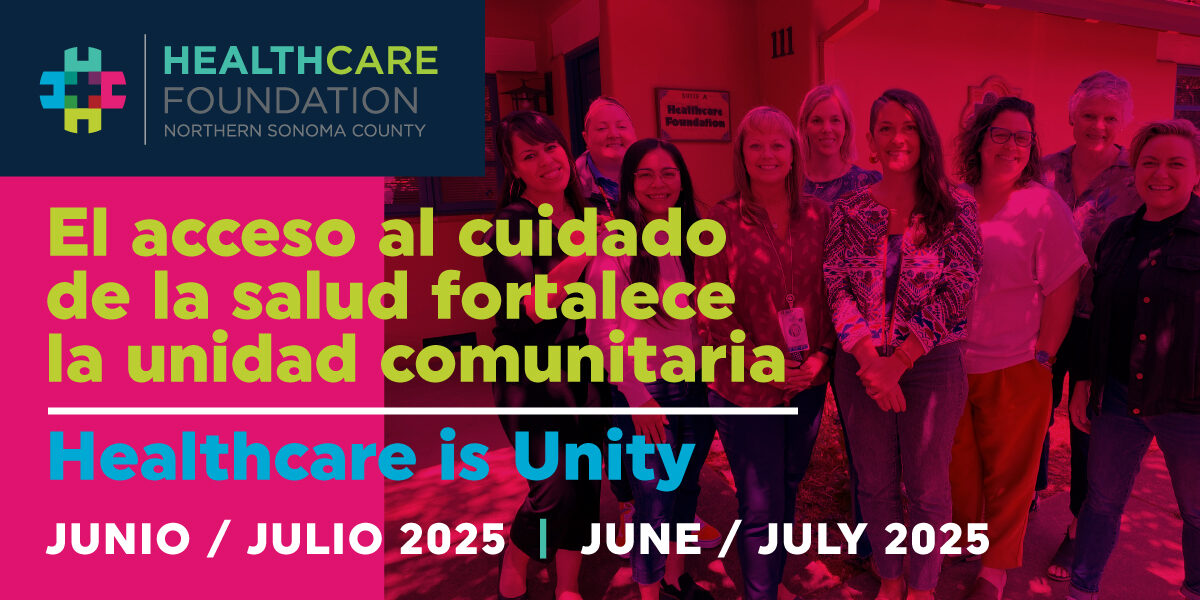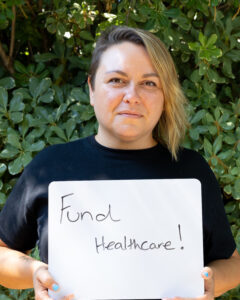

A Conversation with Outgoing Board Chair Scott Hafner
After three years chairing the Healthcare Foundation board of directors, Scott Hafner is stepping down. We spoke with Scott last week about his time with the Healthcare Foundation, its evolving role in the region, and the meaning of service to one’s community.
The Healthcare Foundation has been extremely fortunate to have Scott Hafner as its Board Chair for the past three years. His vast experience, wisdom and heart have played a great role in the organization’s ability to navigate an unprecedented public health emergency while pursuing its mission to support our underserved northern Sonoma County communities with renewed energy and imagination to ensure the greatest impact. Scott joined the Board in January 2017, at a time of transition within the organization, becoming Chair in January 2020.
Scott is co-managing partner of Hafner Vineyard, a small family winery in Alexander Valley, overseeing the marketing and finance side of the business. Before becoming Board Chair of the Healthcare Foundation, Scott had served in leadership roles on the boards of Connecticut College, Pacific School of Religion, Horizons Foundation, Sonoma Land Trust, and other nonprofit organizations. Scott lives in rural Santa Rosa with his husband of 40+ years, Bill Glenn.
We spoke with Scott last week about his time with the Healthcare Foundation, its evolving role in the region, and the meaning of service to one’s community.
What originally brought you into contact with the Healthcare Foundation and motivated you to join its mission?
My husband, Bill, and I had been donors for several years, and our family had been very supportive of the Healthcare Foundation. I had finished a longstanding board commitment with my college on the East Coast. I had done a lot of volunteer work, serving on several boards, but none of them were in Sonoma County. My family has operated a business here for 55 years and has lived here for about the past 41 years. Bill and I have lived in Sonoma County for the past 17 years. I had done this work in San Francisco, in the East Bay, served on a board in Sacramento, in Connecticut, in Contra Costa, but I hadn’t really done something locally. I saw this as an opportunity to get more involved in my local community. At the same time, I was aware of the positive impact of a number of healthcare organizations because my family sought services from some of them and because my colleagues at work had sought services from them.
Clearly service is a big part of your experience. Where does that ethic come from?
It’s the way that I was raised, that it’s really important to be a part of the community and to be a part of community solutions. That usually means showing up, sharing your time, treasure and talent such as it is. The additional piece is that, even though these commitments have been significant, I have gotten far more out of it than I put into it. I’ve gotten a sense of accomplishment and a sense of making a difference. I have also had the deep privilege to work with really good people and to form some lasting friendships.

How has the Healthcare Foundation grown or evolved over the six years of your tenure on the Board?
When I first joined the Board, the Foundation was in a somewhat precarious position because of a leadership transition. And there was a group of Board members who—I’ve never seen a group of people like this—who were really smart and incredibly dedicated, and they got the Foundation through a very challenging time. The Board was led by Barbara Grasseschi during that time frame. We all owe a debt of gratitude to her, and to the people who were on the Board at that time. It’s one thing to serve on a board when everything is going smoothly. It’s an entirely different ball of wax when things are not going smoothly. Every opportunity I get, I pay homage to Barbara and that group of primarily women who were just extraordinarily wise and tenacious.
How have you seen the organization grow in the time since then?
The part that I would comment on is really the change in the last three years. That was precipitated by Covid, which required us to look very, very closely at populations in Sonoma County that were the most at-risk and the most likely to not benefit from services. It caused us to focus our mission in a way that was very black and white. To make sure that our resources were being used most strategically, where they would have the largest potential impact for good. So one factor was Covid. Another important factor was the very wise decision that the Board made to hire Kim Bender as our Executive Director in March 2020. Kim’s deep experience in human services, nonprofit management, fundraising, and community organizing allowed us to focus our mission in a seamless way. Because part of what any nonprofit grapples with is both what they are going to do and what they are not going to do. It’s always easy to figure out what you want to do. It’s much harder to say no, I’m sorry, we’re not going to do that, we’re going to leave that to someone who can do a better job, we don’t have the resources to do that, we don’t want to spread ourselves too thin, we want to make a meaningful impact. We focused all that during a time of human trauma, global human trauma.
The Healthcare Foundation does much reaching out to community partners in an attempt to strengthen networks and coordination. Does that grow out of the pandemic and the need for the response to be as rapid, effective and coordinated as possible?
Part of the historical mission, at least for the last six years, has been a convening and collaborative role to bring together community organizations, so that people would work together and weren’t working in isolation. That preceded the pandemic. But it became more important during the pandemic, and it also happened during a time when there was an increased realization of the importance of community decision-making, or what we call trust-based philanthropy, where community organizations have a very important place at the table to advocate for not just what they need but how the funder can be most supportive. One of the changes has been a broader cultural shift towards trusting community organizations who are the recipients of grants.
The Board invites community partners to talk at meetings. Is that a priority of the Board?
It’s a priority of the Board and it’s something that Kim is particularly well-suited to lead. It’s not unlike site visits that foundations might do. We’ve used technology to have these presentations on a monthly basis from organizations that we fund and that we can learn from.
“I think the biggest challenge in the country is allowing good people of differing opinions to have a respectful, meaningful conversation where they can learn from each other. . . . I’m very proud of my Board colleagues that we have waded into some of those topics with an openness and a patience towards each other, which gives me more hope about the future.”
Scott Hafner, Outgoing Board Chair
Are there other changes to the Board you would note?
One of the changes that has also happened in the last three years is that the Board is more representative of the community that we serve. An increased value has been placed on making sure that the Board is populated with people from communities that we serve. I think that we have one of the most heterogeneous, talented, and dedicated boards in Sonoma County. One of the things that has made me most proud of the work that the Board has done has been grappling with issues where we don’t all see eye to eye. I think the biggest challenge in the country is allowing good people of differing opinions to have a respectful, meaningful conversation where they can learn from each other. I think that is a critical, serious national issue. And I’m very proud of my Board colleagues that we have waded into some of those topics with an openness and a patience towards each other, which gives me more hope about the future.
Is there anything you would like to say to future or prospective Board members?
Doing this work is an invitation to live beyond oneself. You end up meeting people you wouldn’t have met otherwise. You have the privilege of working with them. You get to have your preconceived notions challenged with the potential of learning and growing. All the meaningful friendships that my husband Bill and I have made in the last 40 years together have almost been exclusively as a result of volunteering in the community. If you’re fortunate enough to live in a community that you love, there is an incredible value to giving back and working to address challenges that the community is facing. Whether that means you’re serving on a board or delivering meals or asking for money or investigating conservation easements or doing trail maintenance, I don’t think you can find someone who does that work who doesn’t feel like they have gotten more out of it than they think they put in.

Related News + Stories
Invest in Our Community
Your support is vital to our collective vision of eliminating health inequities in northern Sonoma County.
Donate



